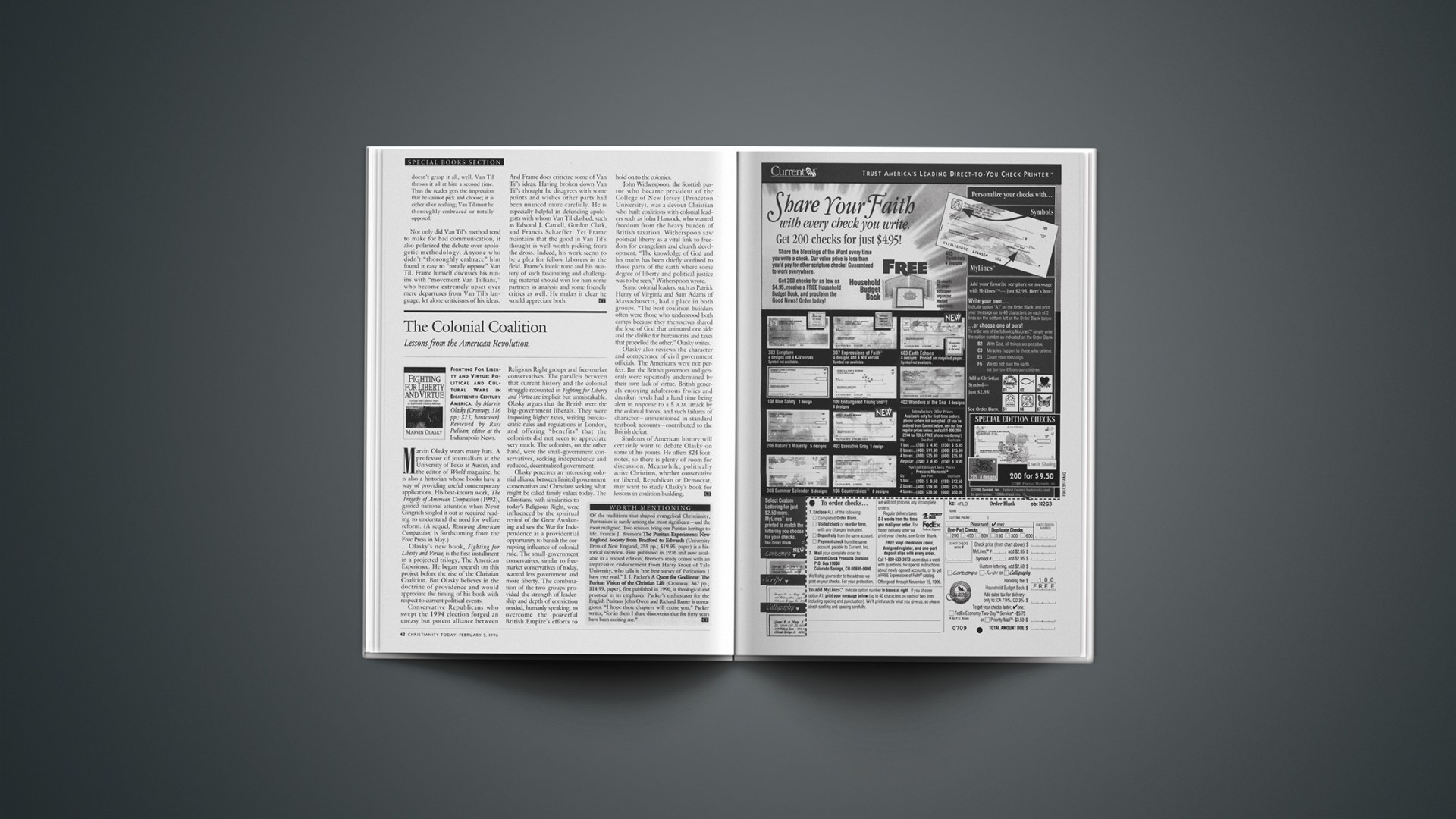“Fighting For Liberty and Virtue: Political and Cultural Wars in Eighteenth-Century America,” by Marvin Olasky (Crossway, 316 pp.; $25, hardcover). Reviewed by Russ Pulliam, editor at the Indianapolis News.
Marvin Olasky wears many hats. A professor of journalism at the University of Texas at Austin, and the editor of World magazine, he is also a historian whose books have a way of providing useful contemporary applications. His best-known work, “The Tragedy of American Compassion” (1992), gained national attention when Newt Gingrich singled it out as required reading to understand the need for welfare reform. (A sequel, “Renewing American Compassion,” is forthcoming from the Free Press in May.)
Olasky’s new book, “Fighting for Liberty and Virtue,” is the first installment in a projected trilogy, “The American Experience.” He began research on this project before the rise of the Christian Coalition. But Olasky believes in the doctrine of providence and would appreciate the timing of his book with respect to current political events.
Conservative Republicans who swept the 1994 election forged an uneasy but potent alliance between Religious Right groups and free-market conservatives. The parallels between that current history and the colonial struggle recounted in Fighting for Liberty and Virtue are implicit but unmistakable. Olasky argues that the British were the big-government liberals. They were imposing higher taxes, writing bureaucratic rules and regulations in London, and offering “benefits” that the colonists did not seem to appreciate very much. The colonists, on the other hand, were the small-government conservatives, seeking independence and reduced, decentralized government.
Olasky perceives an interesting colonial alliance between limited-government conservatives and Christians seeking what might be called family values today. The Christians, with similarities to today’s Religious Right, were influenced by the spiritual revival of the Great Awakening and saw the War for Independence as a providential opportunity to banish the corrupting influence of colonial rule. The small-government conservatives, similar to free-market conservatives of today, wanted less government and more liberty. The combination of the two groups provided the strength of leadership and depth of conviction needed, humanly speaking, to overcome the powerful British Empire’s efforts to hold on to the colonies.
John Witherspoon, the Scottish pastor who became president of the College of New Jersey (Princeton University), was a devout Christian who built coalitions with colonial leaders such as John Hancock, who wanted freedom from the heavy burden of British taxation. Witherspoon saw political liberty as a vital link to freedom for evangelism and church development. “The knowledge of God and his truths has been chiefly confined to those parts of the earth where some degree of liberty and political justice was to be seen,” Witherspoon wrote.
Some colonial leaders, such as Patrick Henry of Virginia and Sam Adams of Massachusetts, had a place in both groups. “The best coalition builders often were those who understood both camps because they themselves shared the love of God that animated one side and the dislike for bureaucrats and taxes that propelled the other,” Olasky writes.
Olasky also reviews the character and competence of civil government officials. The Americans were not perfect. But the British governors and generals were repeatedly undermined by their own lack of virtue. British generals enjoying adulterous frolics and drunken revels had a hard time being alert in response to a 5 a.m. attack by the colonial forces, and such failures of character–unmentioned in standard textbook accounts–contributed to the British defeat.
Students of American history will certainly want to debate Olasky on some of his points. He offers 824 footnotes, so there is plenty of room for discussion. Meanwhile, politically active Christians, whether conservative or liberal, Republican or Democrat, may want to study Olasky’s book for lessons in coalition building.
Copyright © 1996 Christianity Today. Click for reprint information.










